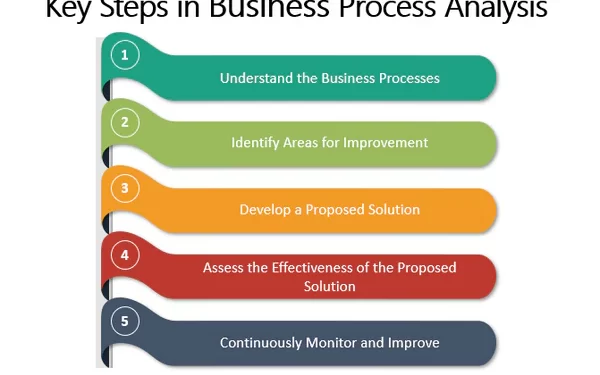In today’s fast-paced business landscape, organizations constantly seek ways to optimize operations to stay competitive. Business analysts play a pivotal role in this process, as they identify inefficiencies and implement solutions to improve business processes. This business analyst guide will delve into the intricacies of business process improvement (BPI) and provide business analysts with practical strategies and techniques to enhance organizational efficiency.
Understanding Business Process Improvement
Business Process Improvement (BPI) is a systematic approach to identifying, analyzing, and enhancing existing business processes to achieve desired outcomes such as increased efficiency, reduced costs, and improved customer satisfaction. At its core, BPI aims to streamline workflows, eliminate redundancies, and maximize resource utilization.
The Role of Business Analysts in BPI
Business analysts serve as catalysts for change within organizations. They possess a unique blend of analytical skills, domain knowledge, and business acumen that enables them to identify areas for improvement and propose practical solutions. In the context of BPI, business analysts play several vital roles:
1. Process Mapping and Analysis: Business analysts meticulously document existing business processes through process mapping and flowcharting techniques. By visually representing workflows and identifying bottlenecks, they gain valuable insights into areas ripe for improvement.
2. Requirement Elicitation: Effective BPI requires a thorough understanding of stakeholder requirements. Business analysts conduct interviews, workshops, and surveys to elicit requirements from key stakeholders, including employees, customers, and management.
3. Root Cause Analysis: Identifying the root causes of inefficiencies is crucial for implementing sustainable process improvements. Business analysts utilize tools such as root cause analysis (RCA) to identify and address underlying issues at their source.
4. Solution Design and Implementation: Based on their analysis, business analysts collaborate with cross-functional teams to design and implement solutions that address identified gaps and opportunities. This may involve leveraging technology, revising policies and procedures, or reorganizing workflows.
5. Facilitating Communication and Collaboration: Business analysts act as bridges between various stakeholders involved in the BPI process. They facilitate collaboration between different departments, teams, and individuals to ensure alignment and synergy in efforts to improve business processes. By fostering open dialogue and encouraging cross-functional cooperation, business analysts help break down silos and promote a shared understanding of goals and objectives.
6. Data Analysis and Insights: In the age of big data, business analysts play a vital role in harnessing data to drive informed decision-making in BPI initiatives. They leverage data analytics tools and techniques to analyze process performance metrics, identify trends, and uncover hidden patterns or correlations. By transforming raw data into actionable insights, business analysts empower organizations to make evidence-based decisions and prioritize areas for improvement effectively.
7. Change Management: Implementing BPI initiatives often involves significant changes to existing workflows, systems, and organizational structures. Business analysts serve as change agents, guiding stakeholders through the change management process and mitigating resistance. They communicate the rationale behind BPI efforts, address concerns, and provide support to help employees adapt smoothly to new methods and technologies. By fostering a culture of change readiness and resilience, business analysts ensure the successful implementation and sustainability of BPI initiatives.
8. Continuous Monitoring and Optimization: BPI is not a one-time event but an ongoing continuous improvement process. Business analysts are responsible for monitoring the effectiveness of implemented solutions and identifying opportunities for further optimization. Through regular performance reviews, feedback collection, and benchmarking against industry standards, business analysts ensure that business processes remain efficient, agile, and responsive to evolving business needs and market dynamics.
9. Risk Management: Every BPI initiative entails inherent risks, ranging from technical challenges to organizational resistance. Business analysts conduct risk assessments to identify potential barriers to successful implementation and develop risk mitigation strategies to address them proactively. By anticipating and mitigating risks early in the BPI process, business analysts help minimize disruptions and ensure the smooth execution of improvement efforts.
10.Quality Assurance and Compliance: Ensuring adherence to quality standards and regulatory requirements is paramount in BPI initiatives, especially in highly regulated industries such as healthcare and finance. Business analysts collaborate with compliance experts and quality assurance teams to incorporate regulatory requirements into redesigned processes and verify compliance throughout the implementation phase. Business analysts help mitigate compliance risks and uphold organizational integrity and reputation by embedding quality assurance measures into BPI efforts.
In summary, business analysts play multifaceted roles in BPI initiatives, ranging from process mapping and analysis to change management and risk mitigation. By leveraging their analytical skills, domain knowledge, and collaborative abilities, business analysts drive meaningful change, optimize business processes, and contribute to organizational growth and success.
Effective Strategies for Business Process Improvement
While every organization’s BPI journey is unique, several proven strategies can help business analysts drive meaningful change and achieve tangible results:
1. Define Clear Objectives: Before embarking on any BPI initiative, it’s essential to establish clear objectives and key performance indicators (KPIs) to measure success. Whether the goal is to reduce cycle times, improve quality, or enhance customer satisfaction, clarity of purpose is paramount.
2. Engage Stakeholders: BPI is a collaborative endeavor requiring all stakeholders’ buy-in. Business analysts must engage stakeholders at every process stage, from initial discovery to solution implementation. Building consensus and fostering a culture of continuous improvement are critical success factors.
3. Utilize Lean and Six Sigma Principles: Lean and Six Sigma are proven methodologies for process optimization. Business analysts can leverage value stream mapping, waste reduction, and statistical analysis to identify inefficiencies and drive process improvements.
4. Embrace Technology: In today’s digital age, technology plays a central role in BPI. Business analysts should explore technological solutions such as automation, data analytics, and workflow management systems to streamline processes and enhance productivity.
5. Iterative Approach: BPI is an iterative process that requires ongoing evaluation and refinement. Business analysts should adopt an agile mindset, continuously gathering feedback, measuring outcomes, and adapting strategies based on evolving business needs. Check out more information about Business Analyst Certification.
Case Study: Implementing BPI in a Financial Services Firm
To illustrate the abovementioned principles, let’s consider a hypothetical case study of a financial services firm seeking to improve its loan approval process. As part of the BPI initiative, a team of business analysts was tasked with identifying bottlenecks and streamlining the process to reduce turnaround times and improve customer satisfaction.
The business analysts began by mapping out the existing loan approval process, documenting each step from application submission to final decision. Through stakeholder interviews and data analysis, they identified several pain points, including manual document review, lack of standardization, and communication delays between departments.
Using Lean principles, the business analysts proposed a series of process improvements, including implementing an automated document management system, standardized approval criteria, and cross-functional collaboration tools. These changes aimed to reduce errors, eliminate unnecessary steps, and expedite decision-making.
Over several months, the BPI team worked closely with stakeholders to implement the proposed solutions, conducting training sessions, monitoring performance metrics, and soliciting end-user feedback. As a result of these efforts, the firm reduced loan processing times by 30%, improved accuracy rates, and enhanced the overall customer experience.
Conclusion
As trusted advisors, business analysts are uniquely positioned to drive meaningful change within organizations by identifying inefficiencies, implementing solutions, and delivering measurable results. By embracing proven strategies, leveraging technology, and fostering a culture of continuous improvement, business analysts can help organizations achieve sustainable success in today’s dynamic business environment.
This blog is written by Adaptive US. Adaptive US provides success guaranteed CBAP, CCBA, ECBA, AAC, CBDA, CCA, CPOA online, virtual and on-premise training, question banks, study guides, simulators, flashcards, audio-books, digital learning packs across the globe. Adaptive US is the only training organization to offer a promise of 100% success guarantee or 100% refund on its instructor-led training.














